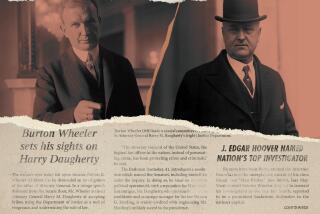Marshall Asked FBI for Help Against Left
- Share via
WASHINGTON — Civil rights leader Thurgood Marshall was so worried in the 1950s about Communist Party efforts to infiltrate and influence the NAACP that he turned to the FBI for advice, newly released agency files indicate.
“The matter which is worrying him more than anything else right at the moment is the Communist Party’s effort to get into the NAACP and forge out to the forefront,” said a 1952 memo by Louis B. Nichols, assistant to then-FBI Director J. Edgar Hoover.
Marshall, at times a forceful critic of the FBI in those years, had traveled to Washington from New York City for a meeting with Nichols after trying to meet with Hoover.
Marshall, who became the first black Supreme Court justice in 1967, was general counsel of the National Assn. for the Advancement of Colored People at the time.
He died in 1993, two years after poor health forced him to retire from the court.
A longtime crusader for racial justice, Marshall was linked in FBI reports of the 1940s and early 1950s to organizations such as the National Lawyers’ Guild, then considered a Communist front.
The allegations had a long life. When Marshall was nominated by President Johnson to the Supreme Court, Sen. Robert C. Byrd (D-W.Va.) wrote to Hoover to ask whether reports linking Marshall to Communist groups were true.
The 1,200 pages of FBI files on Marshall include episodes in which he attacked the agency’s diligence in investigating crimes against black victims and instances in which he sought its guidance.
In a 1946 letter to then-Atty. Gen. Tom Clark, Marshall questioned the FBI’s performance in probing race riots in Columbia, Tenn.; lynchings in Minden, La.; and the beating of a black man in Batesburg, S.C.
“Such a record demonstrates the uneven administration of federal criminal statutes, which should not be tolerated,” Marshall told Clark.
A 1968 memo tells of Marshall’s calling an FBI agent to report that he was the target of a Black Panther demonstration at the University of Wisconsin and asking whether the agency knew if similar action was planned when he attended a University of Georgia event.
Although he generally voted for broad free-press rights, Marshall was not fond of the news media.
In 1982, Marshall apparently was outraged by a magazine article called “How to Write Dirty,” which purported that he was its author. The article contained many coarse and crude sexual comments.
The FBI discovered that the article was a spoof published in the National Lampoon. “No FBI jurisdiction is apparent,” an agent told Webster.
Information from the files was published in USA Today on Monday.
More to Read
Sign up for Essential California
The most important California stories and recommendations in your inbox every morning.
You may occasionally receive promotional content from the Los Angeles Times.













